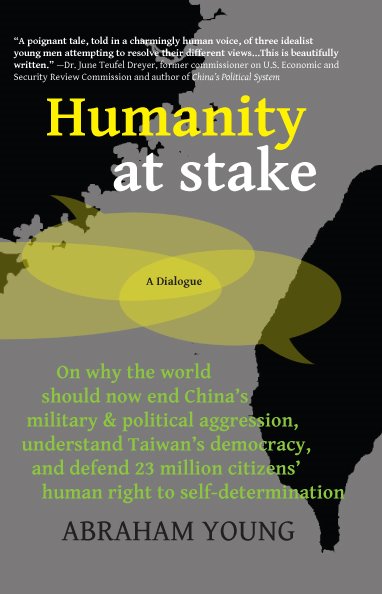(Readers are welcome to contribute any news sources they find that help document the history and present un-"status-quo" across the Taiwan Strait. To send a tip, email HumanityAtStake@gmail.com with subject line "Un-status quo".)
Dec. 2006: Taipei Times, June Teufel Dreyer's "The Fictional 'Status Quo'" Part 1 | Part 2
In April 1999, at a conference held at the Fletcher School to commemorate the 20th anniversary of the TRA, Richard Bush, then the head of the American Institute in Taiwan, mentioned the US commitment to the status quo.
When I asked him for a definition of the term, Bush replied with a self-deprecating smile: "We haven't yet figured out how to operationalize the status quo."
In addition to US' inability to operationalize the status quo, even for itself, another fundamental problem is that at least three different opinions exist on the meaning of the status quo, one for each of the three main parties involved in the "Taiwan issue," which, as Taiwan sources frequently point out, really ought to be called the China issue...
In the case of China, it has changed the status quo by, among other actions, carrying out a military modernization program that seems specifically targeted at an invasion of Taiwan.
This includes, among other things, deploying massive numbers of short-range missiles that are pointed at Taiwan, initiating an ambitious submarine enhancement program and significantly expanding its sea mining assets.
Beijing also passed an anti-secession law in March last year...
As for Taiwan, President Chen Shui-bian (
陳水扁 ) made a number of promises in his first inaugural address, one of which was that he would not abolish the National Unification Council.However, in February, he announced that the Council's functions would cease.
There was a brief but heated debate about what ceasing the functions of the council meant. Analysts agreed this was weaker than "abolishing" the council but stronger than "freezing" or "suspending" it...
Moreover, none of the parties involved seems concerned when the status quo gets changed in a direction it likes.
There were no cries of protest from Beijing when the Taiwanese government, in 1991, gave up its claim to the right to administer the "mainland" or have the Chinese provinces represented in the Legislative Yuan in Taipei.
Also, in May last year, following statements by some Taiwan opposition party figures who said positive things about unification during meetings in Beijing, the Beijing Review observed that changes in the status quo in the direction of unification are actually a good thing.
The US has gone on record as saying that it is in favor of a solution to the complex relationship between Taiwan and China that has the assent of the Taiwanese people, which would represent a change in the "status quo."
One problem is that US policymakers themselves often do not seem to know or remember what US policy is.
As a case in point, in the Shanghai Communique, the US simply acknowledged the People's Republic of China's (PRC) claim that all Chinese people on either side of the Taiwan Strait believe that there is only "one China," of which Taiwan is a part.
In addition to acknowledging -- rather than accepting the PRC's claim -- the phrase contains another bit of verbal evasion: It said nothing about the views of many Taiwanese who don't believe that they are Chinese, but whose existence the US drafters were well aware of...
If the term "status quo" means so many things to so many people, maybe the US, Japan and the EU could agree that the term means "no use of force."
Maybe we could say that "status quo" has that minimal base or core meaning, so that, although the cross-strait problem has not been solved, adherence to even differentially defined concepts of the status quo could allow cross-Strait disputes to be managed.
I would argue that this wouldn't work because Beijing has a different strategy.
Beijing clearly sees that such international opposition to unification as exists states only that it is opposed to the actual use of force, and moreover says very little about what the consequences would be if force were used.
As a case in point, the European Commission report to the European Parliament in October said that policy should take account of the EU's opposition to any measure which would amount to a unilateral change of the status quo and its strong opposition to the use of force.
After the report was issued, I asked two questions of two European Commission specialists on east Asia.
First, I asked whether they saw the PRC's rapid military buildup as a violation of the status quo.
Their answer: China is prospering economically. Its natural that the PRC should want a more powerful military.
A reasonable translation of the gentlemen's statement would be that the commission does not think the arms buildup is anything to worry about.
My second question was that, given this military buildup and the PRC's various threats that it might have to effect unification by force, what would the EU's "strong opposition to force" mean in concrete terms?
The EU has no army and, given its many members, has had difficulty coming to any form of consensus on foreign policy and defense issues.
Would this "strong response" simply be a strongly worded statement saying "we are critical of Beijing's actions?"
The answer was noncommittal: "We would respond strongly."... (Taipei Times, June Teufel Dreyer's "The Fictional 'Status Quo'" Part 1 | Part 2)


